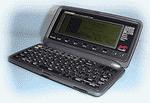|
Lucid's
History
A Heritage of Innovative Software Solutions
Lucid's heritage began
in 1983 when Dallas, Texas entrepreneur, Sam Redman, had the concept of
developing a spreadsheet for portable computers and Redman founded a developmental
laboratory for that stated purpose. In his quest Redman engaged
Michael Stanford and they began developing software for the first notebook
computer, the Tandy Model 100. Next, Redman invited Stanford to join
him as an owner and they incorporated as PCSG corporation (Portable Computer
Support Group). Subsequently, the name was changed to Lucid Corporation.
Eighteen products were developed for this computer system, including the
first version of the award winning spreadsheet, Lucid® 3-D.
Many of those software programs (as well as specialized technology such
as breakthrough barcode reading routines) were licensed to Tandy
corporation and sold throughout the Radio Shack chain. Other original developments
were done for the Italian business equipment company, Olivetti, as well
as numerous other US computer companies. Since then, Lucid built a name
that is recognized worldwide for high-quality, innovative software solutions.
PC Magazine may have put it best when writing about one of our software
products:
"a technical tour de force in an era that seems to have forgotten
how to write tight code"
In 1985, Phil Mayes joined
Redman and Stanford as Lucid Corporation's principle scientist and through
the efforts of Mayes' development, Lucid moved into the DOS software
market first developing Lightning™, the first commercial disk cache for
the IBM PC. The product was recognized as "Best of 1986" by PC Magazine.
Next, the company, after an exhaustive developmental effort, introduced
Lucid® 3-D for IBM PC and compatible computers, and it won
the "Oscar" of the software industry, the "PC Magazine Award for
Technical Excellence", as the best application software of 1987.
Over the years, Lucid developed many commercially successful products including
a unique Microsoft development contract. This was for Lucid to develop
for Microsoft Corporation a hardware product known as the Mach20 enhancement
board. The completed product was produced and sold by Microsoft as
an adjunct to early versions of Windows.
Lucid is very proud of
its many customers, none more so than Sharp
and Casio. Development efforts for both of these major corporations, starting
in 1988, have been very complex, requiring assembly-level programming in
their proprietary operating systems. These customers, were very concerned
about quality and on-time delivery. Lucid exceeded all of their expectations.
Our spreadsheet, Lucid®
3-D, was built into four models of the Casio B.O.S.S. These machines are
sold worldwide, prominently displaying the Lucid® 3-D logo.
Additionally, Sharp sold several versions of Lucid® 3-D
on IC cards for the Sharp Wizard.

In 1989 Lucid Corporation
was sold to the international diversified giant, Sampoerna
Company, headquartered in Indonesia and continued to develop products
in a very broad range of software technologies. Lucid always aspired to
be the very best!
Lucid®
Technologies, Inc.
|

